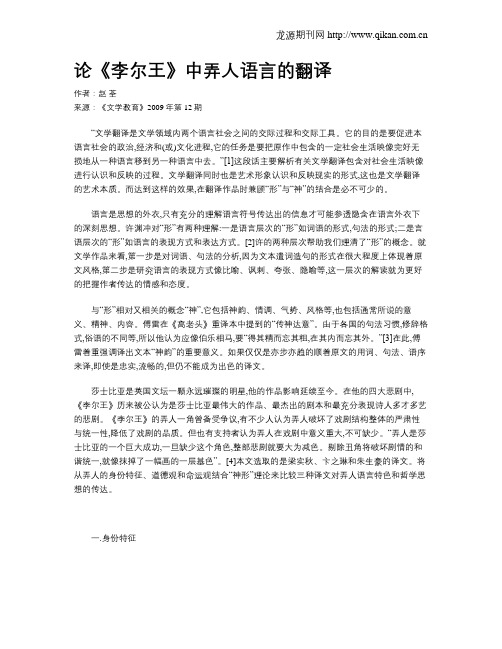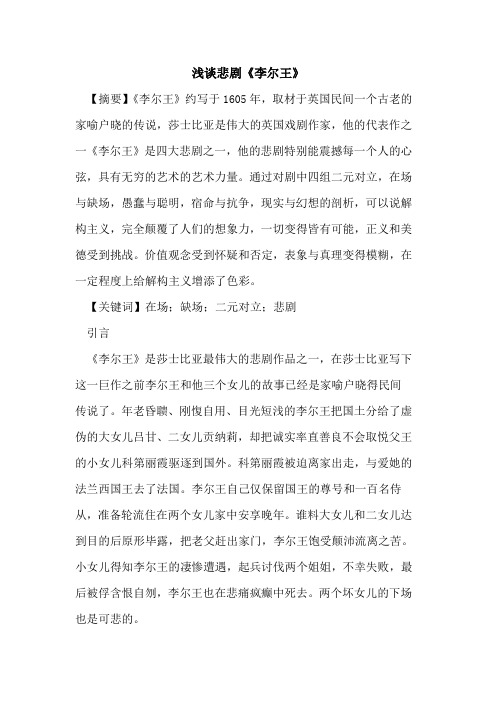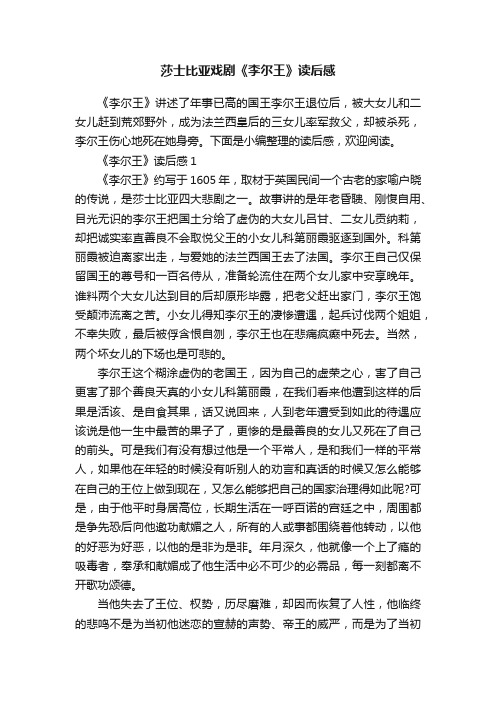莎士比亚李尔王之弄人解析
论《李尔王》中弄人语言的翻译

论《李尔王》中弄人语言的翻译作者:赵荃来源:《文学教育》2009年第12期“文学翻译是文学领域内两个语言社会之间的交际过程和交际工具。
它的目的是要促进本语言社会的政治,经济和(或)文化进程,它的任务是要把原作中包含的一定社会生活映像完好无损地从一种语言移到另一种语言中去。
”[1]这段话主要解析有关文学翻译包含对社会生活映像进行认识和反映的过程。
文学翻译同时也是艺术形象认识和反映现实的形式,这也是文学翻译的艺术本质。
而达到这样的效果,在翻译作品时兼顾“形”与“神”的结合是必不可少的。
语言是思想的外衣,只有充分的理解语言符号传达出的信息才可能参透隐含在语言外衣下的深刻思想。
许渊冲对“形”有两种理解:一是语言层次的“形”如词语的形式,句法的形式;二是言语层次的“形”如语言的表现方式和表达方式。
[2]许的两种层次帮助我们理清了“形”的概念。
就文学作品来看,第一步是对词语、句法的分析,因为文本遣词造句的形式在很大程度上体现着原文风格,第二步是研究语言的表现方式像比喻、讽刺、夸张、隐喻等,这一层次的解读就为更好的把握作者传达的情感和态度。
与“形”相对又相关的概念“神”,它包括神韵、情调、气势、风格等,也包括通常所说的意义、精神、内容。
傅雷在《高老头》重译本中提到的“传神达意”。
由于各国的句法习惯,修辞格式,俗语的不同等,所以他认为应像伯乐相马,要“得其精而忘其粗,在其内而忘其外。
”[3]在此,傅雷着重强调译出文本“神韵”的重要意义。
如果仅仅是亦步亦趋的顺着原文的用词、句法、语序来译,即使是忠实,流畅的,但仍不能成为出色的译文。
莎士比亚是英国文坛一颗永远璀璨的明星,他的作品影响延续至今。
在他的四大悲剧中,《李尔王》历来被公认为是莎士比亚最伟大的作品、最杰出的剧本和最充分表现诗人多才多艺的悲剧。
《李尔王》的弄人一角曾备受争议,有不少人认为弄人破坏了戏剧结构整体的严肃性与统一性,降低了戏剧的品质。
但也有支持者认为弄人在戏剧中意义重大,不可缺少。
浅析《李尔王》人物性格语言

浅析《李尔王》人物性格语言摘要:李尔王是英国的一个古老传说,故事本身大约发生在公元前8世纪左右。
本来平淡无奇的故事,经莎士比亚的生花妙笔,遂显得情趣盎然:情节跌宕起伏,场面丰富多姿,人物性格鲜明,思想深刻生动,语言丰富多彩。
莎士比亚的戏剧语言运用的绚丽丰富成为人类文化的一座丰碑。
本文就《李尔王》一剧,通过分析人物的语言把握人物的性格感受沙剧语言的魅力。
King Lear was an old legend, UK story itself about occurs in about eight century BC. Originally insipid story by Shakespeare, the combination of wit, hence appear interest is full: plot ups and downs, scene rich and varied personality is bright, profoundly vivid, colorful language. Shakespeare's plays the flowery language use of human culture rich become a milestone. This paper will play king Lear, through analyzing the characters' language grasp the characters' personalities feeling sand play language charm.关键词:李尔王;考狄利亚;人物;语言一、李尔王李尔王是这个悲剧的主角。
作为一个统治者,他是专横暴虐、刚愎自用,虚荣心强。
第一幕第一场KING LEAR Meantime we shall express our darker purpose……Tell me,my daughter,Since now we will divest us both of rule,Interest of territory,cares of state,——Which of you shall we say doth love us most?That we our largest bounty may extend.Where nature doth with merit challenge.我现在要想你们说明我的心事……孩子们,在我还没有把我的政权、领土和国事的重任全部放弃以前,告诉我,你们中间哪一个人最爱我?我要看看谁最有孝心,最有贤德,我就给她最大的恩惠。
人性的历练_对_李尔王_中人性的解读分析

[收稿日期]2006-03-27[作者简介]刘红霞(1971-),女,河北邯郸人,讲师,硕士,从事英语教研工作。
人性的历练———对《李尔王》中人性的解读分析刘红霞1,赵立平1,李金玲2(1.河北工程大学文学院,河北邯郸056038;2.邯郸市第23中学,河北邯郸056000) [摘 要]对《李尔王》这部数百年来经久不衰的悲剧作品,文章从《李尔王》中所表达的普遍人性这一主题入手,通过对主人公李尔王人物性格和剧情的分析,着重阐释李尔由于自身存在的“人性”弱点,诸如:刚愎自用、昏庸愚蠢,导致悲剧发生,经过人生痛苦不幸甚至灾难的历练达到人性的升华与完美这一过程。
[关键词]人性;历练;李尔王[中图分类号]I106.3 [文献标识码]A [文章编号]1008-9896(2006)02-0115-02 《李尔王》是莎士比亚伟大悲剧之一,对这部作品数百年来对它的探索从未停止过,解释也层出不穷。
如同世界上一切伟大的文学作品一样,它承受了各种褒贬、相互矛盾的阐释、方方面面的切割,却依然故我地屹立着。
对于后人来说,仍然是一座充满诱惑的迷宫。
本文试图从《李尔王》中所表达的普遍人性这一主题入手,通过对主人公李尔王人物性格和剧情的分析,着重阐释李尔由于自身存在的“人性”弱点,诸如:刚愎自用、昏庸愚蠢,导致悲剧发生,经过人生痛苦不幸甚至灾难的历练达到人性的升华与完美这一过程。
这里的人性指的是普遍人性,人的共性,人的主要特点,而不是偶然性的东西或细微末节。
莎学评论家约翰逊(Samual Johns on ,1709-1784),在他的《莎士比亚戏剧集序言》中很好地表达了他关于“普遍人性”的见解,他写道:“他的人物不受特殊地区的、世界上别处所没有的风俗习惯的限制;也不受学业或职业的特殊性的限制;他的人物更不受一时风尚或暂时流行的意见所具有的偶然性所限制;他们是共同人性的真正儿女,是我们的世界永远会供给,我们的观察永远会发现的一些人物。
悲剧《李尔王》

浅谈悲剧《李尔王》【摘要】《李尔王》约写于1605年,取材于英国民间一个古老的家喻户晓的传说,莎士比亚是伟大的英国戏剧作家,他的代表作之一《李尔王》是四大悲剧之一,他的悲剧特别能震撼每一个人的心弦,具有无穷的艺术的艺术力量。
通过对剧中四组二元对立,在场与缺场,愚蠢与聪明,宿命与抗争,现实与幻想的剖析,可以说解构主义,完全颠覆了人们的想象力,一切变得皆有可能,正义和美德受到挑战。
价值观念受到怀疑和否定,表象与真理变得模糊,在一定程度上给解构主义增添了色彩。
【关键词】在场;缺场;二元对立;悲剧引言《李尔王》是莎士比亚最伟大的悲剧作品之一,在莎士比亚写下这一巨作之前李尔王和他三个女儿的故事已经是家喻户晓得民间传说了。
年老昏聩、刚愎自用、目光短浅的李尔王把国土分给了虚伪的大女儿吕甘、二女儿贡纳莉,却把诚实率直善良不会取悦父王的小女儿科第丽霞驱逐到国外。
科第丽霞被迫离家出走,与爱她的法兰西国王去了法国。
李尔王自己仅保留国王的尊号和一百名侍从,准备轮流住在两个女儿家中安享晚年。
谁料大女儿和二女儿达到目的后原形毕露,把老父赶出家门,李尔王饱受颠沛流离之苦。
小女儿得知李尔王的凄惨遭遇,起兵讨伐两个姐姐,不幸失败,最后被俘含恨自刎,李尔王也在悲痛疯癫中死去。
两个坏女儿的下场也是可悲的。
1.文章中的在场与缺场悲剧表现的是生活的艰辛和明显的不公平。
悲剧经常记叙一个重要人物生活中的一连串重要而偶然相关的事件。
当失去权力地位的主人公遭到大灾难,或者他们最终的死去导致了其他人的垮台时情节就达到高潮。
悲剧情节唤起观众的敬畏之情,他们离开剧场时会对生活的严酷和意义有了全新的认识。
悲剧是对戏剧所激起的怜悯和恐惧心理的一种净化。
德里达的《论文字学》《文字与差异》《语言与现象》三部著作的出版标志这一理论的正式确立。
特别是他的《论文字学》(of grammatology)被认为是解构主义的经典之作。
他主张阐释的多样性和不可终结性,这些构成了解构主义的基本立场。
莎士比亚戏剧《李尔王》读后感

莎士比亚戏剧《李尔王》读后感《李尔王》讲述了年事已高的国王李尔王退位后,被大女儿和二女儿赶到荒郊野外,成为法兰西皇后的三女儿率军救父,却被杀死,李尔王伤心地死在她身旁。
下面是小编整理的读后感,欢迎阅读。
《李尔王》读后感1《李尔王》约写于1605年,取材于英国民间一个古老的家喻户晓的传说,是莎士比亚四大悲剧之一。
故事讲的是年老昏聩、刚愎自用、目光无识的李尔王把国土分给了虚伪的大女儿吕甘、二女儿贡纳莉,却把诚实率直善良不会取悦父王的小女儿科第丽霞驱逐到国外。
科第丽霞被迫离家出走,与爱她的法兰西国王去了法国。
李尔王自己仅保留国王的尊号和一百名侍从,准备轮流住在两个女儿家中安享晚年。
谁料两个大女儿达到目的后却原形毕露,把老父赶出家门,李尔王饱受颠沛流离之苦。
小女儿得知李尔王的凄惨遭遇,起兵讨伐两个姐姐,不幸失败,最后被俘含恨自刎,李尔王也在悲痛疯癫中死去。
当然,两个坏女儿的下场也是可悲的。
李尔王这个糊涂虚伪的老国王,因为自己的虚荣之心,害了自己更害了那个善良天真的小女儿科第丽霞,在我们看来他遭到这样的后果是活该、是自食其果,话又说回来,人到老年遭受到如此的待遇应该说是他一生中最苦的果子了,更惨的是最善良的女儿又死在了自己的前头。
可是我们有没有想过他是一个平常人,是和我们一样的平常人,如果他在年轻的时候没有听别人的劝言和真话的时候又怎么能够在自己的王位上做到现在,又怎么能够把自己的国家治理得如此呢?可是,由于他平时身居高位,长期生活在一呼百诺的宫廷之中,周围都是争先恐后向他邀功献媚之人,所有的人或事都围绕着他转动,以他的好恶为好恶,以他的是非为是非。
年月深久,他就像一个上了瘾的吸毒者,奉承和献媚成了他生活中必不可少的必需品,每一刻都离不开歌功颂德。
当他失去了王位、权势,历尽磨难,却因而恢复了人性,他临终的悲鸣不是为当初他迷恋的宣赫的声势、帝王的威严,而是为了当初被他驱逐出宫受到他诅咒的小女儿,但他却不能从她的长眠中唤回她那颗洋溢着仁爱的热心了,正因为这种.种的遭遇他懂得了最宝贵的是不能用金钱、权势收买的人间真情。
李尔王

《李尔王》中弄人的人物分析莎士比亚在《李尔王》中塑造了一系列经典艺术形象:刚愎自用,通过受难认识与救赎自我的李尔王;美丽善良,不阿谀奉承的考迪利娅;忘恩负义,贪婪丑恶的高纳瑞和里根;野心勃勃的埃德蒙;忠心耿耿的肯特……每一个形象都有着其深刻的内涵与特色。
而我觉得其中的弄人的形象最令我印象深刻的形象的塑造,极具反讽效果。
他在众人眼中是个傻瓜,而事实上,他才是整部戏剧里最清醒、最理智的先知。
他的言语看似疯言疯语,傻傻癫癫,却在这样的剧情中有着“众人皆醉我独醒”的独特效果。
一开始看剧中人物简介的时候,根本不知道弄人是怎样的一个角色,还特地去百度了一番,才知道弄人的传统身份是旧时代王公贵簇豢养在身边专供其逗笑取乐的一种特殊仆人,又称职业小丑、职业傻瓜或说笑者、弄臣或傻瓜。
在《李尔王》中,弄人虽突破了他的传统身份——插科打诨、取乐主人,但又受传统身份束缚,这使他的个人形象既复杂又矛盾。
剧中的弄人是一个智者,他以其卓越的心智、超群的智慧和忘我的献身精神,将矛头直逼李尔的愚蠢和整个人性的痴愚,帮助李尔走完了从懵懂无知到心明眼亮的心理发展历程,“透过他表面上的疯傻和调侃,淋漓尽致地揭示了人物灵魂深处的聪慧与悲哀”。
弄人在剧中是最通透明白的智者。
在李尔与小女儿决裂,送走小女儿之后,他一直郁郁不乐。
在李尔遭到大女儿高纳里尔的为难,在肯特继续为李尔效忠之时,他及时的表达了对肯特的肯定。
针对李尔的遭遇,他同情却也觉得怎么昔日威风的君王变成如今这样,更多的是自己的决策不当,他一出场就暗讽李尔居然被女儿赶出门外,以一个弄人傻傻疯疯的角色说出最具智慧最为犀利的语言更是表达了莎士比亚的核心思想。
在李尔还未明白其实两个女儿都是只为自己的财权的时候,还想着去投奔二女儿的时候,弄人还讽刺的说:其实家苹果和野苹果是无多大差别的。
没有直接点明说的是谁,却让读者一目了然,个人觉得这就是作者将自己思想形象用于这个弄人身上。
弄人在剧中是尽职尽忠的仆人。
面具下的智者——探析《李尔王》中的弄人形象
2021-06文艺生活LITERATURE LIFE,面具下的智者———探析《李尔王》中的弄人形象陈然然(新疆科技学院公共基础部,新疆巴州库尔勒841000)摘要院《李尔王》是莎士比亚四大悲剧之一,在剧中莎士比亚塑造了许许多多令人印象深刻的人物形象,其中弄人这个形象更是深入人心。
弄人本应该是一个痴笨的傻瓜形象,但莎士比亚为我们塑造的弄人却是一位隐藏在滑稽表面下的智者形象。
本文将从弄人的身份特征、弄人智慧在语言上的体现,以及在《李尔王》中三种痴傻的类型来分析弄人在《李尔王》这部剧作中所起到的作用———保持着内心的清醒并以此来警醒李尔。
关键词:弄人;语言特征;疯癫形象中图分类号:I561.073文献标识码:A文章编号:1005-5312(2021)17-0059-02DOI:10.12228/j.issn.1005-5312.2021.17.028一、前言“弄人”,即供人玩弄的人,所谓“弄者,玩也”,在英国通常被称为丑角或小丑。
弄人是调剂王公贵族枯燥无聊的日常生活的一副良药,是古代宫廷中国王闲暇时间供以取乐、解乏的消遣品,故弄人必须常常扮演痴傻的形象以此来取悦主人。
弄人在中国古代也称“优”,“优者,饶也”正说明君主对弄人的宽容与纵容,在《李尔王》中,弄人即使对李尔说“你简直不是个东西”,李尔都没有降罪于他,但与其说是李尔对弄人的喜爱使他豁免于罪,不如说是李尔对弄人言语背后嘲弄涵义的默认。
因为宫廷里充满了肃穆与理智,我们要在理智身边留给傻子一个特权地位,他要不自觉的承担起嘲弄的角色。
①而弄人就是这个傻子。
所以弄人往往也是宫廷中唯一一个具有言语自由权的人,他们用滑稽的言语道常人之不可说或不敢说之道理,他们在愚者的面具下清醒的生存着。
《李尔王》中的弄人可谓是“谈言微中,亦可以解纷”,在他的插科打诨、疯言疯语背后都寓意着深刻的含义。
在莎士比亚剧中,弄人大都具有一种无可比拟的诙谐和无限丰富的智力,②就像弄人唱的歌谣一样:聪明人个个变了糊涂,顶着个没有思想的头,只会跟着人依样葫芦。
李尔王写作手法
李尔王的反讽艺术手法从语言修辞的角度来研究反讽,我主要把注意力集中在反讽话语的形式特征和语义特征,然而,反讽又并不一定表现在具体的词或句上,而在于语境之中。
所以结合语境来谈《李尔王》中的反讽艺术至关重要。
《李尔王》是一部诗剧,它的语言主要表现为人物的语言活动。
因此对其语言反讽艺术的探析则主要在人物的语言修辞层面。
在《李尔王》中,剧中人物语言修辞层面的反讽随处可见。
一是在语言上剧中的人物将截然相反的词语并在一起使用,通过逻辑或常识上的矛盾在文字层面的展示,揭示表面荒谬之下隐含的真理。
而这些真理在剧情的展开中逐渐地显露出来。
“最秀丽的考黛莲,贫穷但也最富有,孤独无依,但最是无双地美妙,被人所贱视,可是最受我珍爱,如果取人家遗弃的可称合法,我如今便取得你和你的那种种美德”。
“还有那性情高贵心地真实的铿德给流放了出去!他的罪过只是诚实!真奇怪”。
贫穷与富有,遗弃和珍爱,罪过是真实这样矛盾的字眼构成一种语境的张力。
在分割王权的角逐中,大女儿和二女儿极尽阿谀之能事,小女儿把最忠诚的心向父亲表白,却什么也没得到,忠诚老实的大臣铿德极力规劝,却落得个流放的下场。
显现出李尔作为一位父亲,一位君王的昏溃和专断跋扈。
将最爱自己与最忠实自己的人放逐。
把权利和荣誉给了欺骗自己的人。
二是人物轻松滑稽的话语方式,由于社会制度的制约,人们谈到性,王权的尊严等禁忌或神圣领域话题以及政治禁忌话题时,往往采取幽默的方式,而这时的幽默又往往采取反讽来掩盖真实意图。
在《李尔王》中这种话语方式在傻子身上得到充分的体现。
作为傻子,他无需顾及颜面,而且他又是李尔身边的“红人”,因而他的话语方式明显的不同于其他人。
莎士比亚用反讽的手法把《李尔王》中的无名弄人刻画成一个集荒诞“傻瓜”与非凡“哲人”于一身的矛盾统一体。
弄人来自社会底层,没有人身自由,在宫廷中逗人发笑,供人玩弄。
自中世纪起至17 世纪,英国各地王公贵族的奴仆中,常有一两名被称为弄臣,他们是讲笑话或滑稽故事等给主人开心解闷,他们的处境与奴仆无多大差别,只配供君主取笑作乐,常受到贵族的侮辱和歧视。
浅析李尔王的悲剧性格
浅析《李尔王》中李尔王的性格悲剧摘要:《李尔王》是莎士比亚的四大悲剧之一,它着力表达的是和谐秩序的问题,是人文主义的重要命题之一。
英格兰的老国王李尔在权势给他带来的尊荣、自豪、自信中迷失本性、丧失理智,幻想以让权分国来证明自己,不当国王而做一个普通人也能同样或更加伟大,因而经受了种种痛苦的磨难。
秩序失衡必然导致人伦蛊坏,道德沦丧,强壮的青年会凌驾衰弱的老人,子女会一拳打死老父亲。
而唯有经过爱与善的牺牲磨炼,方能恢复秩序,迎来和谐恒常。
他的悲剧是人文主义缺失的表现,是他性格的悲剧。
关键词:李尔王;性格悲剧《李尔王》是莎士比亚的四大悲剧之一,主要讲述了李尔王因年事已高,决定把国土分给3个女儿,幻想着摆脱一切政务的牵挂,让自己一身轻以终天年。
大女儿高纳里尔和二女儿里根口蜜腹剑,赢得父王宠信,分到了国土,小女儿考狄利娅不愿阿谀奉承,她诚挚而简洁的表白得罪了李尔王,从而失去继承权。
前来求婚的法兰西国王慧眼识人,娶考狄利娅为皇后。
得到国土的两个女儿很快露出冷酷的真面目,使李尔王连栖身之地也没有,只好跑到荒郊野外去与野兽为伍。
考狄利娅为救父亲,率军队攻入英国,父女得以团圆。
但战事不利,考狄利娅最终被杀死,李尔王守着心爱的小女儿的尸体悲痛地死去。
如果用世俗的眼光来看的话,李尔王是一个善良、慈爱、轻信、刚愎自用的人,他的悲惨命运是由他的性格造成的,人的性格是很复杂的,谁都没有办法说的清楚。
人性中的恶,总是要等到遇到一些事情,才会以其可怕的、残暴的面貌全面展开,善也是同样的。
而在表面,每个人都为社会、家庭,以及舆论这些表面上的东西所掩盖,李尔王便是这样的人。
这位受人爱戴的国王,在性格上面有着致命的缺陷。
作为国王,他习惯了别人的阿谀奉承,喜欢听赞美的话,并且将那视为真实,正是因为这样他的虚荣心才会越来越强,他只想听到甜言蜜语,宁愿活在谎言的世界里,当然,他并不觉得那是谎言。
这样的人必然不习惯于小女儿的诚实和拙于言语。
对莎士比亚《李尔王》中悲剧性的解析运用亚里士多德悲剧理论
对莎士比亚《李尔王》中悲剧性的解析运用亚里士多德悲剧理论一、本文概述本文旨在通过运用亚里士多德的悲剧理论,对莎士比亚经典悲剧《李尔王》进行深入解析。
亚里士多德在其《诗学》中提出的悲剧理论,为后世的戏剧批评和创作提供了重要的理论框架。
本文将从亚里士多德悲剧理论的角度出发,探讨《李尔王》中的悲剧性元素,包括情节结构、角色塑造、悲剧冲突以及悲剧效果等方面,以期揭示该作品所蕴含的深刻悲剧内涵。
《李尔王》作为莎士比亚四大悲剧之一,讲述了国王李尔因听信谗言,将忠诚正直的大女儿赶出家门,最终在悲惨的境遇中醒悟,但为时已晚。
这部作品中的悲剧性不仅体现在李尔王个人的命运转折上,更体现在整个社会的道德沦丧和人性的扭曲上。
通过运用亚里士多德的悲剧理论,我们可以更深入地理解这部作品所展现的悲剧性,以及其中所蕴含的深刻社会意义。
在接下来的论述中,本文将首先回顾亚里士多德的悲剧理论,然后结合《李尔王》的具体情节和角色塑造,逐一分析其中的悲剧性元素。
希望通过这样的解析,能够更好地揭示莎士比亚在这部作品中的悲剧艺术,同时也为悲剧理论的应用提供一个具体的案例分析。
二、情节与悲剧性在亚里士多德的悲剧理论中,情节是构成悲剧的重要因素之一。
对于莎士比亚的《李尔王》而言,情节的设置与展开无疑充分展现了悲剧性的内核。
亚里士多德认为,悲剧的情节应该具备“整一性”,即事件的发展应当围绕一个中心展开,形成一个有机的整体。
在《李尔王》中,整个剧情紧密围绕着李尔王对忠诚与背叛的误解、对亲情与权力的抉择等核心主题进行展开,构成了一个高度整一的情节结构。
从情节的结构上看,《李尔王》遵循了亚里士多德所说的“突转”和“发现”两个关键要素。
突转指的是剧情的突然转变,而发现则是指主人公对于真相的突然领悟。
在李尔王的故事中,突转表现为李尔王对忠诚与背叛的误解,以及他因此遭受的悲惨命运。
发现则体现在李尔王在遭受流放和失去一切后,终于看清了真相,但此时的他已经陷入了疯狂,无法挽回自己的命运。
- 1、下载文档前请自行甄别文档内容的完整性,平台不提供额外的编辑、内容补充、找答案等附加服务。
- 2、"仅部分预览"的文档,不可在线预览部分如存在完整性等问题,可反馈申请退款(可完整预览的文档不适用该条件!)。
- 3、如文档侵犯您的权益,请联系客服反馈,我们会尽快为您处理(人工客服工作时间:9:00-18:30)。
Class: Class 3School Number: 20064398Name: Wei YunCourse Name: Selected Readings inBritish Literature Role Analysis of the Fool in King LearFool is an important role freq uently appeared in Shakespeare‟s works, such as Touchstone in As You Like It, Feste in Twelfth Night,Lavatch in All's Well That Ends Well, etc. The fool in King Lear is of course a character figured successfully, revealing the truth with seemingly addlepated words. Actually, in his woks, though figured as an antagonist, the fool is taken as Shakespeare‟s prolocutor, with great wisdom and philosophy. Through not scrupling to speak the truth out, they satirize human depravity boldly and served as a sharp comparison with the villain of the piece in the plays. They insufflate a gloomy wind into the bright and warm world in the comedies, and affuse a rational and warmhearted spring to the somber and cruel world. They apperceive everything and escape from the subcelestial confusion; they seem insane but actually not; they own vivid image, unique personality, spiritual indifference and insular character; they have extraordinary artistic charm in Shakespeare‟s works.…Fool‟ means …a man employed by a king or queen to entertain people by telling jokes, singing songs, etc‟ in the dictionary.① The fool represents the need of freedom instead of rules and regulations, he has the freedom to speak out whatever he sees without the worldly consideration and disguise. So the fool could also be regarded as a foresighted person and discovers the irrationality and absurdness of the society from a particular visual angle. His humorous and seemingly foolish words bring us laugh but they contain wisdom and truth as the same time.With regard to the fool in King Lear, as an irreplaceable role in this play, the fool is the symbol and extension of Cordelia, the teacher of King Lear and saves King Lear in the end. It was him who reve als Lear‟s foolishness directly, criticizes Goneril and Regan‟s selfishness and cruelty inexorably and also companies Lear, reminds him and saves him.The first mention of him was in other‟s words, when Lear asks the Knight to call the fool, the Kn ight answers “Since my young lady‟s going into France, sir, the fool hath much pine d away.”﹙ActⅠ, scene ⅳ﹚, thus building close connection between the fool the young daughter of Lear, Cordelia. Cordelia represents the sincerity, kindness, beauty and honesty in the play; she is endowed with beautiful features. Therefore, the fool‟s being sentimentally attached to her shows the fool‟s love and hate as well as his sense of value. His standpoint is revealed even before his appearance. After driving away his favorite daughter Cordelia, King Lear transfers his favoritism to the fool, as if he were Cordelia. He feels empty after C ordelia‟s leaving, and the fool always tells the truth like Cordelia, Lear knows clearly in his heart that who is really good to him. He begins to miss his young daughter immediately after her leaving, but he could not own her any more, then he takes the fool as a stand-in to some degree. “Where's my knave? my fool? Go you, and call my fool hither.” “Where's my fool, ho? I think the world's asleep.”“Why came not the slave back to me when I called him”“But where's my fool? I have not seen him this two days.”“Go you, call hither my fool.”﹙ActⅠ, Scene ⅳ﹚When his daughter Goneril refuses to see him, he feels angry and hurt, he thinks of his young daughter, then he call the fool hurriedly and continuously. At that time, he needs some comfort, he needs someone to company him, the person could only be the fool, the representation of his favorite daughter. On the other hand, to the fool, he also behaves like a father, he cares about the fool with all his heart. “Come on, my boy: how dost, my boy? art cold?”﹙ActⅢ, Scene ⅳ﹚When they are deserted in heavy storm in the wild with the fool‟s company, he is still concerned of the fool and cares him gently. All his action is stimulated by the reminding of Cordelia. Actually, though Lear drives Cordelia away from him, he never drivers her out of his mind. Especially when he is deeply hurt by Goneril and Regan, he grasps the fool tightly to seek strength; he keeps the fool with him to spend his hardest time, dreaming that he receives spiritual compensation from his young daughter. Therefore, the fool is figured as another Cordelia, reminding and comforting King Lear when Cordelia is absent in the play. The most obvious connection between the fool and Coedelia is built in the climax of the play when Learloses both the fool and his young daughter, “And my poor fool is hang'd!” King Lear screams.﹙ActⅤ, Sceneⅲ﹚Here it also alludes his beloved daughter‟s death.The fool‟s another role in the play is Lear‟s teacher and saves Lear from desperation. He is the pronoun of true humanity and the model of Lear. The fool has profound insight and particular discernment, as if endowed with a certain holy power, and his special position determines his being permitted to speak everythiung. And it is exactly the two conditions make him become Lear‟s teacher.He often say s “I'll teach thee a speech.” ﹙ActⅠ, scene ⅳ﹚and “All thy other ti tles thou hast given away; that thou wast born with.” ﹙ActⅠ, scene ⅳ﹚he calls Lear as a fool. He is always displaying his superiority to the king; however, he is tolerated and favored instead of being severely punished. “Dost thou know the difference, my boy, between a bitter fool and a sweet fool?” ﹙ActⅠ, scene ⅳ﹚he talks as if Lear is his fool. “No, lad; teach me.” ﹙ActⅠ, scene ⅳ﹚King Lear played the game with the fool pleasantly. “Mark it, nuncle: Have more than thou showest…And thou shalt have more than two tens to a score.” “That lord that counsell'd thee to give away thy land…The one in motley here, t he other found out there” “Why, after I have cut the egg i' the middle,.. They know not how their wits to wear, th eir manners are so apish.” …﹙ActⅠ, scene ⅳ﹚In humoristic words, the fool teaches Lear some truth and rules in the society and acerbicly points out Lear‟s false decision to desert his young daughter. He always companies Lear wherever he goes, whatever he is. “But I will tarry; the fool will stay, and let the wise man fly: the knave turns fool that runs away; the fool no knave, perdy.” From the words he tells Kent, he states his standpoint and his reason to stay with Lear. He is called a fool not for his being quarter-witted, but for his loyalty and straightness. He knows Lear is not a falsifier, so he is willing to company him. He wants to protect Lear, when Lear is abandoned in the wild, homeless. He does not lecture Lear any more, he tries to comfort Lear and persuade Lear. Throughout his playact, he is always making effort to teach Lear the social cruelty, to weep out Lear‟s false pride, to make him realize his fault of driving Cordelia away. When Lear confessed his fault and no longer takes himself as a king but a sheer father and human being, the fool finishes his task and disappears from thenon.As an important antagonist, the fool brightens the sad atmosphere of the tragedy with his humorous words. He is also endowed with new role in this play: as the representation and extension of Cordelia, he companies Lear and carries forward Cordelia‟s noble characters, further reve aling the theme; as Lear‟s teacher, he imparts truth to Lear, criticizes his foolishness, and helps him get rid of his self-righteous habit. Only when we have a through comprehension of the fool, can we have a deeper understanding of the protagonist, Lear. Since they are similar and have an amalgamationcrasis in the end to some degree. Insaneness is the acme of emotion in Shakespeare‟s tragedies. It is the depicting of this particular role make laugh rends the tragedy, making people laugh with tears, meditate while laughing.①the Oxford Advanced Learner‟s English-Chinese Dictionary(the Oxford University Press ,the 6th Edition)﹙1415﹚。
